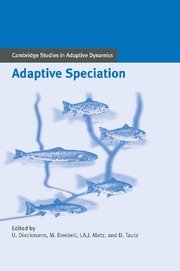Book contents
- Frontmatter
- Contents
- Contributing Authors
- Acknowledgments
- Notational Standards
- 1 Introduction
- 2 Speciation in Historical Perspective
- A Theories of Speciation
- B Ecological Mechanisms of Speciation
- 8 Speciation and Radiation in African Haplochromine Cichlids
- 9 Natural Selection and Ecological Speciation in Sticklebacks
- 10 Adaptive Speciation in Northern Freshwater Fishes
- 11 Sympatric Speciation in Insects
- 12 Adaptive Speciation in Agricultural Pests
- 13 Ecological Speciation in Flowering Plants
- 14 Experiments on Adaptation and Divergence in Bacterial Populations
- C Patterns of Speciation
- References
- Index
13 - Ecological Speciation in Flowering Plants
Published online by Cambridge University Press: 05 July 2014
- Frontmatter
- Contents
- Contributing Authors
- Acknowledgments
- Notational Standards
- 1 Introduction
- 2 Speciation in Historical Perspective
- A Theories of Speciation
- B Ecological Mechanisms of Speciation
- 8 Speciation and Radiation in African Haplochromine Cichlids
- 9 Natural Selection and Ecological Speciation in Sticklebacks
- 10 Adaptive Speciation in Northern Freshwater Fishes
- 11 Sympatric Speciation in Insects
- 12 Adaptive Speciation in Agricultural Pests
- 13 Ecological Speciation in Flowering Plants
- 14 Experiments on Adaptation and Divergence in Bacterial Populations
- C Patterns of Speciation
- References
- Index
Summary
Introduction
Speciation refers to divergence of phenotype, and the evolution of reproductive barriers between populations that exhibit the different phenotypes. Either of these components of speciation may involve adaptation by natural selection. In this context several terms have been coined (see Chapter 1, in particular Box 1.1). Any speciation in which reproductive isolation follows directly or indirectly from adaptation to ecological conditions has been termed ecological speciation (e.g., Hatfield and Schluter 1999). In contrast, this volume defines the term adaptive speciation as lineage splitting in sympatry (or parapatry) through a process of frequency-dependent selection. This latter definition thus includes some, but not all, forms of ecological speciation and vice versa.
In this chapter we adopt the broader term ecological speciation, as we review the forms it may take in flowering plants, or angiosperms, and explore whether there is evidence for adaptive speciation more specifically. Most of the about 300000 angiosperm species rely on animals for pollination, and the dramatic evolutionary radiation of the angiosperms over the past 100 million years is roughly contemporaneous with radiation in several animal taxa from which modern pollinators are drawn. As a result, pollination is thought by many investigators to be a critical ecological factor in speciation (Baker 1963; Crepet 1984; Eriksson and Bremer 1992; Grimaldi 1999; but see Ricklefs and Renner 2000). We outline several scenarios for pollinator-mediated speciation, paying special attention to the unusual role of pollinators as external agents of gene transfer.
- Type
- Chapter
- Information
- Adaptive Speciation , pp. 264 - 277Publisher: Cambridge University PressPrint publication year: 2004
- 54
- Cited by



